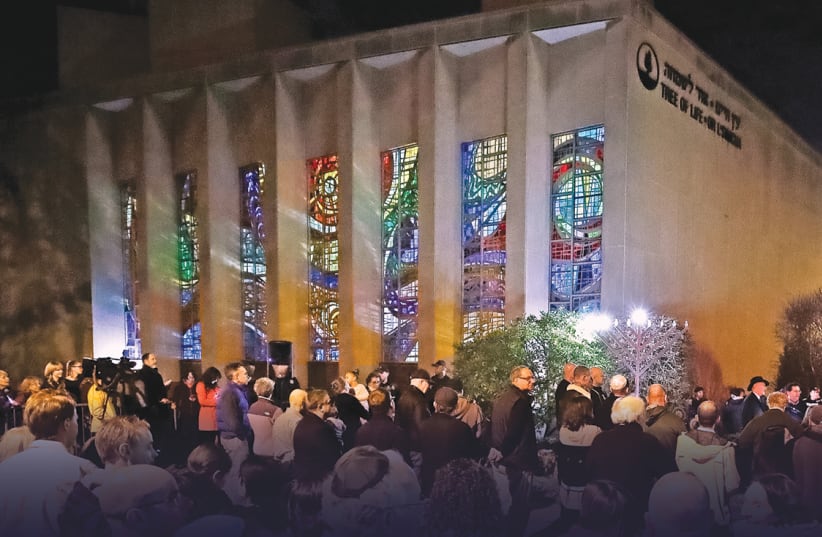On October 27, 2018 Robert Gregory Bowers entered the Tree of Life Synagogue in the close-knit, heavily Jewish neighborhood of Squirrel Hill in Pittsburgh and began shooting. By the end 11 members of three different congregations were killed, and six others wounded. It was, and remains, the deadliest attack on the Jewish community in the US.
Now, two years later, 23 members of the community, some who survived the attack, have written a moving collection of essays exploring different facets of the attack and the aftermath. What comes across in all of the essays is just how close-knit a neighborhood Squirrel Hill is, and how the tragedy has strengthened those bonds.
The book is edited by Beth Kissileff (full disclose: she is a friend) and Eric Lidji. Kissileff is a novelist, journalist and author who is also the spouse of Rabbi Jonathan Perlman of New Light Congregation, who survived the attack by hiding himself and others. Lidji is the director of the Raub Jewish History Program at the Senator John Heinz History Center. He is in charge of the effort to preserve documentation of the attack.
“Eric and I knew each of the authors personally,” Kissileff said. “Our main criteria was to find people who were good writers as well as academics, journalists, rabbis and poets. It was important to us to find two people from each congregation, and we wanted a diverse group of voices to present stories that were not presented elsewhere.” All of the pieces are well-written, and offer insights into the horrific attack.
“The story starts with being unable to tell the story. It ends with a riddle,” is how Kissileff starts her essay called Honey from the Carcass. “For me, it began when the words of my husband reached my ears, though what they meant was ultimately unclear to both of us. “There’s been a shooting at the shul.” She then writes of her inability to write about the attack for many months. What ultimately helped her was the story of Samson who kills a lion, now knowing his own strength. Sometime later, he passes the same spot, and sees the carcass of the lion, but this time filled with bees and honey.
“Our task now, as individuals and as a congregation, is to be ourselves the bees, to find the ways to create that honey, to hold and support new memories, ideas, and endeavors. We can’t bring any of the eleven dead back, but we can honor their memories by valuing what they valued and continuing our paths as Jews, as a congregation and as a community.” As a journalist, I especially enjoyed the essays by journalists on how they covered the attack. For Andrew Goldstein, a young journalist for the Pittsburgh Post-Gazette, the story was the biggest of his career. It was also personal.
“Although I did not directly experience the shooting and while my family and friends were safe, the massacre was emotionally jarring,” he writes in the book. “I knew some of the victims. I knew the synagogue. I knew the neighborhood and the community and the city. And because of that sense of belonging, I felt as though I were under attack. I was horrified and distraught. How was I supposed to write about this without fear or favor.” What comes across is how close-knit the community of Squirrel Hill, both Jews and non-Jews, is. Some families have lived in the neighborhood for generations, and almost everyone in town knew one of the victims.
Co-editor Eric Lidge said he envisioned the book as an expression of what writer Cynthia Ozick calls “blowing through the narrow end of the shofar.”
“You speak from specificity but the noise is heard broadly,” he said. “I hope it gives people locally permission to tell their stories. The feelings that are described are not necessarily Pittsburgh feelings or Jewish feelings but human feelings.” Bound in the Bond of Life
Pittsburgh Writers Reflect on the Tree of Life Tragedy
Edited by Beth Kissileff and Eric Lidji
University of Pittsburgh Press, 2020
Hardcover: 256 pages; $25
